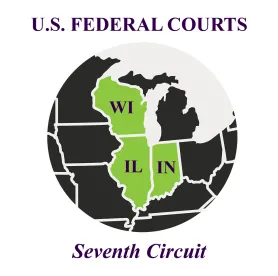Although the employer’s pay system for its auto repair technicians was complicated and at times redundant, it nevertheless constituted a bona fide commissions compensation method subject to exemption from the overtime pay provisions of the Fair Labor Standards Act (FLSA), the Seventh Circuit Court of Appeals has held. Reed v. Brex, Inc., 2021 U.S. App. LEXIS 23573 (7th Cir. Aug. 9, 2021). The Seventh Circuit has jurisdiction over the federal courts in Illinois, Indiana, and Wisconsin.
The Commissioned Salesperson Exemption
The FLSA generally requires that employees be paid overtime, at a rate of at least one and a half times their regular rate of pay for all hours worked beyond 40 in a week. 29 U.S.C. § 207(a)(1). However, this requirement does not apply to employees working in retail or service establishments, if their regular rate of pay is at least one and a half times the statutory minimum wage and more than half of their compensation comes from bona fide commissions on goods or services. Id. § 207(i). The term “commission” is not defined in the FLSA, and litigation has arisen from time to time about whether employees are truly being paid on a commission basis, particularly when the compensation system is not a straight percentage based on sales. According to DOL regulations, if “commissions vary in accordance with the employee’s performance on the job,” he or she may qualify for the exemption, 29 C.F.R. § 779.416(b), whereas a commission is not “bona fide” if the employee “always or almost always earns the same fixed amount of compensation for each workweek.” Id. § 779.416(c).
Background
The latest case to grapple with the issue involves Brex, which operates a chain of auto-repair shops in Illinois and Missouri and where the plaintiffs worked as auto repair technicians. Brex’s pay system for its technicians is a bit complicated. It begins with calculating total receipts for repairs and sales during a pay period. That number is divided by hours worked to yield an average “hourly production” rate. That rate is then converted to an hourly wage, which typically is about 16 to 17 percent of the hourly production rate. The hourly wage may be increased slightly (e.g., by 50 cents), depending on whether the technician has obtained certain repair certifications, and it is then multiplied by the number of hours the technician worked during the week to obtain his or her base wages. On top of those wages, the technician is paid a set amount for each tire installed during the pay period, an amount that increases if the technician installs a certain minimum number during the pay period. If in a given pay period a technician’s production falters, the company applies an hourly wage equal to one and a half times the applicable state minimum wage, rounded up, thereby guaranteeing that the employee’s pay satisfies the first requirement of the commissioned salesperson exemption. Company records undisputedly showed that the commissions pay system was applied about 84% of the time, with the alternative minimum pay system applying the rest of the time.
The Lawsuit
The plaintiffs alleged the company’s pay system is not a bona fide commissions plan because it incorporates the employee’s hours worked into so many steps; because the company’s description of the pay plan makes reference to “hourly” wages; and because the plan does not discourage the company from requiring its technicians to work long hours, as historically has been a purpose of the FLSA. Following discovery, the trial court granted summary judgment to Brex, and the plaintiffs appealed. In affirming summary judgment for the company, the Seventh Circuit noted that the undisputed facts show that Brex pays each technician, including the plaintiffs, based on his or her actual sales and therefore the plan is a valid commissions pay system.
As to the pay plan referring to and incorporating what are described as “hourly wages,” the Court of Appeals reiterated that “the nomenclature is not determinative.” In reality, while “[t]he formula is convoluted, [] it is mathematically identical to paying a straight commission. First multiplying and then dividing by the same number (hours worked) is equivalent to multiplying by one.” Furthermore, the fact that technician pay is partially a function of hours worked does not create a triable issue of fact, the Seventh Circuit added. “Obviously, to some extent, technicians who work more hours are likely to have more repair opportunities and therefore make more money.” Moreover, as was the case here, “small hourly bonuses for certification do not convert an employee’s pay into a standard wage[,] so long as ‘more than half his compensation … represents commissions on goods and services.’”
Finally, the Seventh Circuit addressed the plaintiffs’ “unusual alternative argument that they were paid too much.” In asserting this argument, the plaintiffs relied primarily on the applicable regulations’ use of the phrase “a guarantee or draw against commissions” in the DOL regulations, which they read as containing alternative words with the same meaning. Under their interpretation, the company’s alternative wage floor is prohibited “because the regulations define any wage ‘guarantee’ as a draw against future commissions that requires reconciliation in subsequent pay periods.” Therefore, they asserted, because the company did not “claw back” its technicians’ guarantee payments in subsequent pay periods, “all compensation up to the guarantee was actually fixed hourly wages even in weeks where the guarantee did not apply” and the company’s plan would not satisfy the exemption’s requirement that more than half of an employee’s income must come from commissions.
Rejecting this argument, the Seventh Circuit noted that under the statute, a “draw” and a “guarantee” are not in fact one and the same: “The plain meaning of the Act allows employers to implement either a guarantee or a draw, which are two distinct arrangements.” DOL regulations permit employers to provide employees with “periodic payments, which are described variously in retail or service establishments as ‘advances,’ ‘draws,’ or ‘guarantees,’” as a means of offsetting the fluctuations common in commissioned sales arrangements, and those regulations further allow – but do not require – employers to “claw back” such payments if they exceed actual commissions. Moreover, the regulations explicitly provide that such guaranteed payments may operate as an alternative minimum floor within a bona fide commissions system, as long as there is no evidence that, as a means of avoiding overtime pay, the employer has implemented a sham “guaranteed commission” that employees rarely, if ever, can exceed. Adopting the plaintiff’s interpretation, noted the Court of Appeals, would lead to an “improbable, even perverse, outcome,” as:
"[t]he entire point of the [FLSA] is to require or encourage employers to pay their employees more, not less. Yet [the plaintiffs] say that Brex should have paid them less by docking their pay during weeks of plenty to compensate for the lean weeks. The statute and regulations do not require us to find that an employer violates the Act by paying its employees more than necessary. We will not strain to read them to arrive at that odd result."





 />i
/>i

